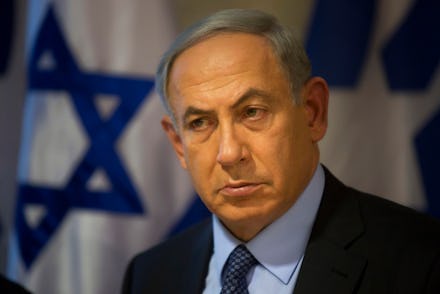Benjamin Netanyahu Blamed the Holocaust on the Palestinians, and Germany Isn't Having It

On Tuesday night, Israeli Prime Minister Benjamin Netanyahu delivered a controversial speech in which he claimed German leader Adolf Hitler originally had no intention of killing Jews during World War II.
It was, Netanyahu said, the Grand Mufti of Jerusalem, Haj Amin al-Husseini, the Palestinian leader at the time, who flew to Berlin to convince Hitler to kill them. During the 37th World Zionist Congress, Netanyahu said Hitler initially wanted to expel them, but al-Husseini instructed Hitler to "burn" the Jews instead.
Germany's official representative refused to accept the prime minister's revisionist history and said the fault was theirs and theirs alone. Imagine that.
"All Germans know the history of the murderous race mania of the Nazis that led to the break with civilization that was the Holocaust," Steffen Seibert, German Chancellor Angela Merkel's spokesman said, according to Reuters. "I see no reason to change our view of history in any way. We know that responsibility for this crime against humanity is German and very much our own."
Netanyahu's comments are being condemned by "Israeli historians and opposition leaders," along with Palestinians, the New York Times reports.
"And this attack and other attacks on the Jewish community in 1920, 1921, 1929, were instigated by a call of the Mufti of Jerusalem Haj Amin al-Husseini, who was later sought for war crimes in the Nuremberg trials because he had a central role in fomenting the final solution," Netanyahu said in his speech.
"He flew to Berlin," Netanyahu continued. "Hitler didn't want to exterminate the Jews at the time; he wanted to expel the Jews. And Haj Amin al-Husseini went to Hitler and said, 'If you expel them, they'll all come here.' 'So what should I do with them?' he asked. He said, 'Burn them.'"
"It is a sad day in history when the leader of the Israeli government hates his neighbor so much so that he is willing to absolve the most notorious war criminal in history, Adolf Hitler, of the murder of 6 million Jews during the Holocaust," Saeb Erekat, secretary general of the Palestine Liberation Organization said, according to the International Business-Times.
"His regrettable statements have deepened the divide during a time when a just and lasting peace is needed most, further fueling the political issue into a religious one, and underscoring his commitment to the continued occupation and violence against Palestinians," Erekat added.
Israeli parliamentary opposition leader Isaac Herzog also condemned Netanyahu. "This is a dangerous historical distortion and I demand Netanyahu correct it immediately as it minimizes the Holocaust, Nazism and ... Hitler's part in our people's terrible disaster," Herzog wrote, the Washington Post reports.
Social media also percolated and overflowed with outrage at the speech, reproaching the prime minister for his comments, including award-winning Jewish novelist Linda Grant, who described them as "profoundly toxic."
Netanyahu responded to the furor by asserting he does not absolve Hitler's role in the genocide, but it would be "absurd" not to recognize the Grand Mufti's.
While al-Husseini's extremist nationalism is well-documented — he fervently fought for an independent Palestine and was known to hobnob with Nazis — mainstream historians and scholars have rejected the suggestion he played a part in the Holocaust. In fact, in November 1941, when Hitler and al-Husseini first met, the Holocaust was already underway.
But there do remain some fringe historians who attempt to make the case that Palestinians are responsible for it.
Barry Rubin and Wolfgang Schwanitz argued in their 2014 book Nazis, Islamists and the Making of the Modern Middle East that al-Husseini was the mastermind behind the mass extermination of European Jews. However, many have called into question the veracity of the sources and evidence Rubin and Schwanitz use to make this argument.
"Much of the material to support this comes from Fritz Grobba (former German envoy to Kabul, Baghdad and Riyadh, and Muslim-Arab affairs officer in the Nazi foreign ministry) – 'highly dubious evidence,' in the words of Gilbert Achcar, whose own research fills a volume of tremendous historical importance (The Arabs and the Holocaust) – and from the observation that Haj Amin and his colleagues were the only Nazi allies (apart from fascist movements) who gave their support to the 'genocide plan,'" the Independent wrote in their review of the book.
Even some strong proponents of Zionism who might contend al-Husseini had some part to play in that period of history have argued that doesn't make present-day Palestinians responsible. And, in fact, doing so could be detrimental to all parties involved.
"It is true that the Mufti was a terrible genocidal Nazi; it's also true, however, that he's dead," Jeffrey Goldberg, a journalist with a Middle East focus, wrote in the Atlantic in 2009. "In the interest of encouraging Palestinian moderates ... I think it's not overly useful to equate the Palestinians of today with their long-gone leader."